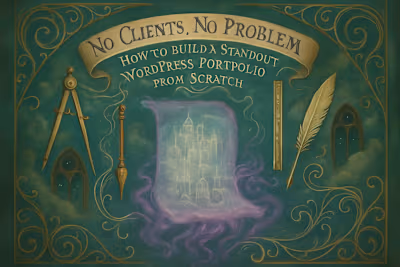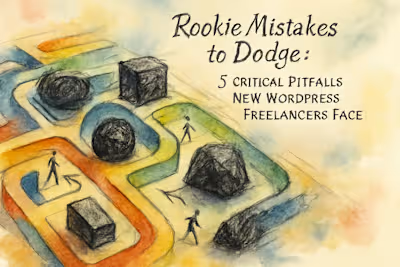Niche Down or Go Broad? How to Define Your WordPress Services and Market

Niche Down or Go Broad? How to Define Your WordPress Services and Market
The Power of Niching Down
Become the Go-To Expert
Charge Higher Rates
Streamline Your Marketing and Workflow
How to Identify Your Profitable Niche
Assess Your Skills and Interests
Research the Market for Demand
Start Broad, Then Specialize
Defining and Packaging Your Services
Move from Services to Solutions
Create Service Packages
Be Clear About What You Don't Do
The Case for Being a Generalist
Wider Range of Opportunities
Variety and Skill Development
Making Your Choice and Moving Forward
References
Niche Down or Go Broad? How to Define Your WordPress Services and Market
One of the biggest strategic decisions a WordPress freelancer will make is whether to offer a wide range of services or to specialize in a specific niche. This choice affects your marketing, pricing, and the types of clients you attract. To succeed, you also need the right toolkit to deliver your services efficiently. Ultimately, your goal is to land high-value projects with the best WordPress freelancers in the market.
This decision isn't just about what services you offer. It shapes your entire freelance business. Your choice between specializing and staying broad affects how you position yourself, who you work with, and how much you can charge. Let's explore both paths to help you make the right choice for your WordPress freelance career.
The Power of Niching Down
Specializing in a specific area allows you to become a recognized expert, face less competition, and command higher rates. A niche can be based on an industry, a type of client, or a specific technical skill.
Think about it this way. When someone needs heart surgery, they don't go to a general practitioner. They seek out a cardiac specialist. The same principle applies to WordPress freelancing. Clients with specific needs often prefer specialists who understand their unique challenges.
Your niche might be building membership sites for online course creators. Or perhaps you specialize in WooCommerce stores for fashion brands. Maybe you're the go-to person for WordPress speed optimization. The key is finding an area where your skills meet market demand.
Become the Go-To Expert
When you focus on a single area, you develop deep expertise. This establishes you as an authority, making you the obvious choice for clients in that niche.
Let's say you decide to specialize in WordPress sites for restaurants. After building ten restaurant websites, you understand the industry inside out. You know restaurants need online ordering systems, reservation management, and menu displays that work on mobile. You speak their language. You understand their pain points.
This expertise makes you incredibly valuable. Restaurant owners will choose you over a generalist because you "get" their business. You can offer insights beyond just building a website. You become a trusted advisor, not just a service provider.
Your portfolio becomes more compelling too. Instead of showing random projects, you showcase a collection of successful restaurant websites. Potential clients see immediately that you're the expert they need.
Charge Higher Rates
Expertise is valuable. Clients are willing to pay a premium for a specialist who deeply understands their specific needs and can deliver superior results.
A generalist WordPress developer might charge $50-75 per hour. But a specialist in e-commerce migrations? They might command $150-200 per hour. Why? Because they bring specialized knowledge that saves time and reduces risk.
Consider this scenario. A business needs to migrate from Shopify to WooCommerce. A generalist might figure it out, but it'll take longer. They'll hit roadblocks. They might miss important details. A migration specialist has done this dozens of times. They know the pitfalls. They have proven processes. They can guarantee a smooth transition.
The specialist delivers better results faster. That's worth paying more for. Clients understand this. They'd rather pay $10,000 to an expert than $5,000 to someone learning on their dime.
Streamline Your Marketing and Workflow
Marketing becomes easier because you have a clearly defined target audience. Your work processes also become more efficient as you solve similar problems repeatedly.
When you know exactly who you serve, marketing becomes straightforward. Instead of casting a wide net, you can focus your efforts. You know where your ideal clients hang out online. You understand their concerns and can speak directly to them.
Your content marketing becomes more effective too. Rather than writing generic WordPress tips, you create content that addresses your niche's specific challenges. If you work with nonprofits, you might write about donation plugin comparisons or GDPR compliance for charities. This targeted content attracts exactly the right clients.
Your workflow improves dramatically when you work on similar projects. You develop templates, checklists, and standard operating procedures. What took 40 hours on your first project might take 20 hours by your tenth. You can deliver faster without sacrificing quality.
How to Identify Your Profitable Niche
Finding the right niche is a process of introspection and market research. It's about finding the intersection of your skills, your interests, and a viable market need.
Don't rush this decision. Take time to explore different options. The perfect niche combines three elements: something you're good at, something you enjoy, and something people will pay for. Missing any of these elements makes success much harder.
Assess Your Skills and Interests
Start by looking inward. What aspects of WordPress development do you enjoy most? Are you passionate about e-commerce, performance optimization, or working with a specific industry like real estate or non-profits?
Make a list of your strongest technical skills. Are you exceptional at custom theme development? Do you love solving complex plugin conflicts? Maybe you're great at making sites lightning fast. These technical strengths can form the foundation of your niche.
Next, consider the industries or causes you care about. Working in an area you're passionate about makes the work more enjoyable. If you love fitness, building sites for gyms and personal trainers might be perfect. If you're passionate about education, you might focus on schools or online course creators.
Think about your past projects too. Which ones did you enjoy most? Which clients were easiest to work with? Often, patterns emerge that point toward your ideal niche. Maybe you've noticed you work best with small business owners who value personal relationships. Or perhaps you thrive on complex technical challenges for larger organizations.
Research the Market for Demand
A niche is only viable if there are clients willing to pay for it. Use tools like Google Trends and keyword research to gauge demand and competition for potential niches.
Start with basic market research. Search for WordPress developers in your potential niche. If you find many successful specialists, that's a good sign. It means there's enough demand to support multiple freelancers. If you find nobody, either you've discovered an untapped market or there's no demand.
Use Google Trends to check search volume for your niche. Are people searching for "WordPress developer for lawyers" or "WooCommerce expert for fashion brands"? Rising search trends indicate growing demand.
Check job boards and freelance platforms. How many projects match your potential niche? What are clients paying? This gives you real data about market demand and pricing expectations.
Don't forget to validate your niche with actual conversations. Reach out to potential clients in your target market. Ask about their WordPress challenges. Would they value a specialist? What would they pay for specialized expertise? These conversations provide invaluable insights you can't get from online research alone.
Start Broad, Then Specialize
If you're new to freelancing, it's okay to start as a generalist. Taking on different types of projects will help you gain experience and discover what you enjoy and excel at before committing to a niche.
Starting broad gives you valuable exposure to different industries and project types. You might discover you love working with e-commerce sites when you thought you'd prefer blogs. Or you might find that nonprofit clients align perfectly with your values.
This exploration phase is valuable. Work with different clients. Try various project types. Pay attention to what energizes you and what drains you. Notice which projects come easily and which feel like a struggle.
As patterns emerge, you can gradually narrow your focus. Maybe you start by focusing on small businesses. Then you notice most of your favorite clients are in healthcare. Eventually, you might specialize in WordPress sites for dental practices. This organic evolution often leads to more authentic and sustainable niches than forcing a choice too early.
Defining and Packaging Your Services
Once you've decided on a niche (or to remain a generalist for now), you need to clearly define what you offer. This clarity helps clients understand your value.
Vague service descriptions confuse potential clients. They need to quickly understand what you do and how you can help them. Clear service definitions also protect you from scope creep and mismatched expectations.
Move from Services to Solutions
Instead of just listing technical skills (e.g., 'PHP and CSS'), frame your offerings around the problems you solve for clients (e.g., 'Custom Theme Development for Fast, High-Converting Websites').
Clients don't care about your technical skills. They care about their problems getting solved. A restaurant owner doesn't want "WordPress development." They want more online orders and table reservations. Frame your services around these outcomes.
Transform your service descriptions. Instead of "WordPress theme customization," try "Brand-aligned websites that convert visitors into customers." Rather than "Plugin development," offer "Custom functionality that streamlines your business operations."
This shift in language attracts better clients. People looking for the cheapest WordPress help will move on. But business owners seeking real solutions will be intrigued. They'll see you as a partner in their success, not just a technical resource.
Create Service Packages
Consider offering tiered service packages with clear deliverables and set prices. This simplifies the sales process for clients and makes your pricing transparent.
Packages make decision-making easier for clients. Instead of wondering what they need, they can choose from clear options. A basic package might include a five-page WordPress site with standard features. A premium package could add e-commerce functionality, custom design, and ongoing maintenance.
Structure your packages around client needs, not your services. For example, if you work with consultants, you might offer:
Starter Package: Professional presence to establish credibility
Custom WordPress theme matching your brand
Service pages and about section
Contact forms and calendar integration
Mobile-responsive design
Growth Package: Everything in Starter plus tools to attract clients
Blog setup with SEO optimization
Email newsletter integration
Lead magnet delivery system
Social media integration
Authority Package: Everything in Growth plus premium features
Online course or membership area
Advanced analytics setup
Conversion optimization
Priority support and updates
Each package should build on the previous one. This makes upselling natural and helps clients grow with you over time.
Be Clear About What You Don't Do
Defining what's outside your scope of work is just as important. This manages client expectations and prevents scope creep.
Being upfront about your boundaries saves everyone time and frustration. If you don't do graphic design, say so. If you don't work with certain industries or technologies, make that clear. This honesty builds trust and attracts clients who are a good fit.
Create a simple list of what's included and what's not. For instance:
What I Do:
Custom WordPress development
WooCommerce setup and customization
Site speed optimization
Ongoing maintenance and updates
What I Don't Do:
Logo design or branding
Content writing
Social media management
Non-WordPress platforms
This clarity helps in several ways. Clients know exactly what they're getting. You avoid awkward conversations about services you don't offer. And you can build partnerships with other freelancers who complement your services.
The Case for Being a Generalist
While niching down has many benefits, being a generalist can also be a valid strategy, especially when you're starting out or if you thrive on variety.
Not everyone is meant to specialize. Some freelancers love the diversity of working on different projects. Others live in smaller markets where specialization might limit opportunities too much. Being a generalist can be a strategic choice, not just a default position.
Wider Range of Opportunities
As a generalist, you can appeal to a broader client base, which can mean more consistent work, especially in the beginning.
When you're open to various projects, you can say yes to more opportunities. A local bakery needs a simple site? You can help. A startup wants a complex web application? You're on it. This flexibility keeps your pipeline full and your income steady.
Generalists often build strong local networks. You become the go-to WordPress person in your community. Word-of-mouth referrals flow naturally because people know you can handle whatever comes up. This broad appeal can be especially valuable in smaller cities or towns.
The variety also provides financial stability. If one industry hits hard times, you're not dependent on it. When restaurants struggled during lockdowns, specialists in that niche faced challenges. Generalists could pivot to helping businesses move online in other industries.
Variety and Skill Development
Working on diverse projects prevents boredom and allows you to continuously learn and develop a wide range of skills across the WordPress ecosystem.
Every project teaches you something new. An e-commerce site introduces you to payment gateways and inventory management. A membership site teaches you about user roles and content restriction. This constant learning keeps the work engaging and expands your capabilities.
Generalists often become excellent problem-solvers. When you've seen many different scenarios, you develop creative solutions. You can draw from a vast pool of experiences to tackle new challenges. This adaptability is incredibly valuable in the ever-changing world of web development.
The broad skill set also provides career flexibility. If you decide to specialize later, you'll make an informed choice based on real experience. Or you might transition into an agency role where your diverse background helps you manage various projects and team members.
Making Your Choice and Moving Forward
The decision between specializing and staying broad isn't permanent. Your approach can evolve as you grow. What matters is making an intentional choice that aligns with your goals, skills, and market realities.
Start where you are. If you're drawn to specialization but unsure of your niche, begin narrowing gradually. If you love variety, embrace being a generalist while staying alert to emerging patterns in your work. Either path can lead to a successful WordPress freelance career.
Remember that success comes from delivering value, not from following a prescribed path. Whether you become the go-to WooCommerce expert for fashion brands or the versatile WordPress developer who can handle anything, focus on doing excellent work and building strong client relationships.
Take action today. Review your past projects and identify patterns. Research potential niches that interest you. Define your services clearly, whether specialized or broad. Most importantly, start positioning yourself intentionally rather than accepting whatever comes your way.
Your WordPress freelance career is yours to shape. Choose the path that excites you, serves your clients well, and builds the business you want. The market has room for both specialists and generalists who deliver exceptional value.
References
Like this project
Posted Jul 6, 2025
Should you be a jack-of-all-trades or a master of one? Learn how to define your WordPress freelance services, identify a profitable niche, and attract your ideal clients.









